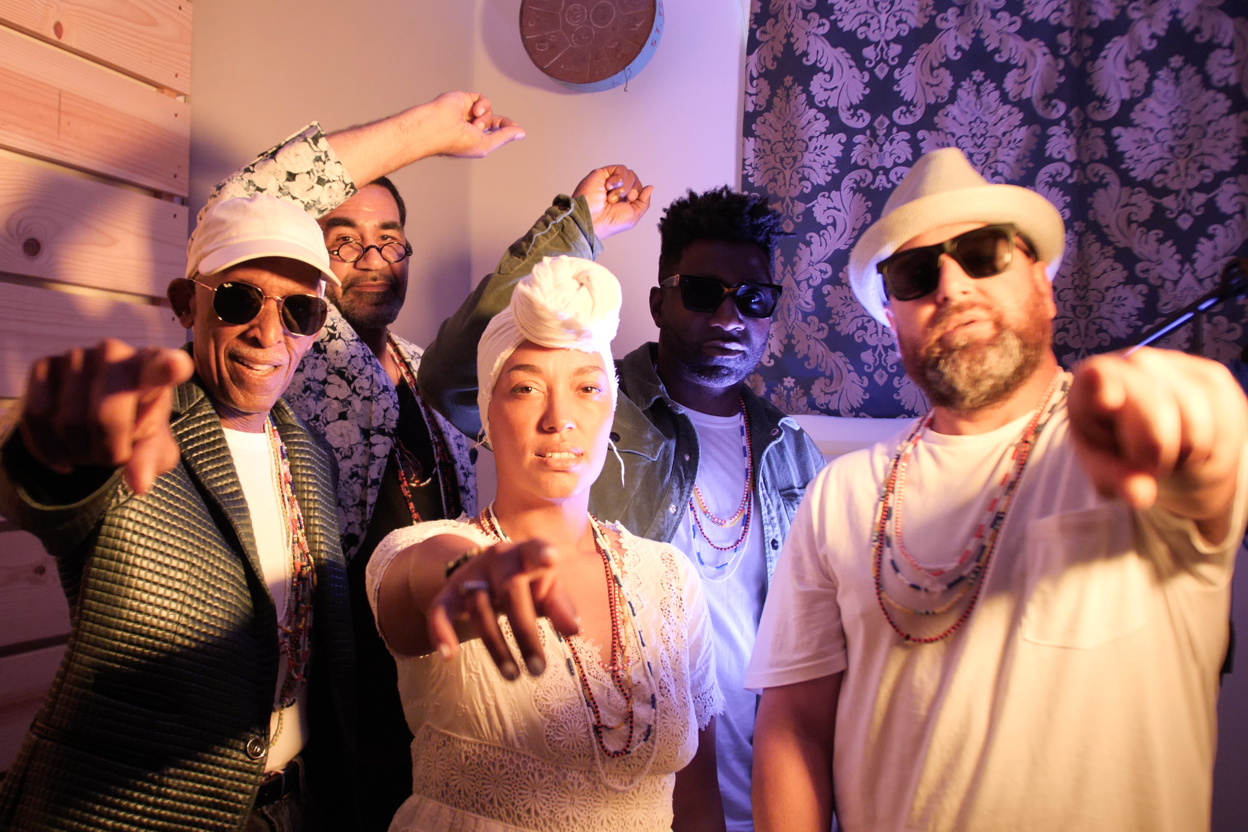|
Getting your Trinity Audio player ready…
|
Our conversation with Bill Summers (part one available here) continues with a further discussion on the Headhunters, how percussionists are often treated differently, the symbolism behind batá drums, and why “Latin rhythms” is a mischaracterization.
PostGenre: Do you feel the emphasis many put on the bottle part on “Watermelon Man” minimizes your contribution to Head Hunters (Columbia, 1973)?
Bill Summers: Well, months after we finished recording the album, it came out. It only had four tracks – “Chameleon”, “Watermelon Man”, “Sly”, and “Vein Melter.” But the album started selling like crazy. I had no idea it would become one of the highest-selling jazz albums in history. My late wife at the time looked at the credits and got angry because I wasn’t mentioned as an arranger even though I helped write the music. So, despite all the proceeds earned on record sales, I never received full credit. Everyone on the record got a writing credit except me.
I went to Herbie and asked why I did not get a credit. He told me that it was because I was “just a percussionist.” That’s not to knock Herbie, but that was just the state of affairs across the board in music. There is a lack of respect for percussionists and what I do. Even when I go to a soundcheck, they check everybody – keys, bass, vocalists, whatever – and then ask me to play only last, if at all.
And, even if I am asked to play, the guy from the booth may tell me to just “play my toys.” When they do, I will ignore the request until someone comes on stage and asks me to play my toys and I have to tell them I don’t have toys, they’re real instruments. It is particularly incredible where it is a band I am the leader of, and I was the leader of the Headhunters.
PG: Why do you think people disrespect percussionists as you describe?
BS: I don’t think they even know they are disrespecting me. I think they have no idea and aren’t doing it on purpose. They are just ignorant. Part of it is just educating people on the power and importance of my instruments. I make it very clear to people not to call my instruments toys.
Herbie, one of many people I could use as an example, had to learn his lack of respect for what I was doing. He didn’t even know he was disrespecting me. You can’t get mad about someone’s ignorance. Instead, you try to educate them and give them some knowledge that they can pass on to the next person. And hopefully, some of the younger guys coming up will learn respect in the process.
As far as royalties specifically, it was incredible how many people sampled that version of “Watermelon Man.” Madonna took the masters solely to use the whistle parts. Her song ended up selling millions of copies. But, I didn’t get the credit to which I was entitled.
PG: It is pretty messed up that you did not get credit for your work.
BS: It’s not screwed up. The reality is that if I had been well schooled, I would never have been abused. It was my fault that it happened. You never really learn about the business side of music when you are a fairly young musician.
But I’m also no victim. Once it happened, I learned my rights and became my own counsel to protect myself. I went to the books to learn everything about the legal side of publishing, songwriting, and the rest. I learned how to make sure, going forward, that I was fairly compensated. Ultimately, I take responsibility for what happened with the credit on “Watermelon Man.” If I had done my homework, it would never have happened.
PG: Going back to a statement you made a little earlier about the lack of respect often afforded percussionists, do you feel the royalty situation would have developed differently if you were, say, primarily a horn or piano player?
BS: Of course.
I mean, I do play saxophone and flute and did so in many bands before I became a professional percussionist. When I was in the Bay Area, I was often hired because I could do more than one thing. So, I’ve played flute, piccolo, and all the saxes. And I could play them very well.
When I was 19, I was working at the Apollo Theater. At the same time, I was both playing sax and flute with a band and percussion with Bobby Womack. One day I was on stage with Bobby Womack. When I got off stage and went to the back room to get my horns, I found that they were all stolen. Every last horn I had was gone; about $20,000 worth of stuff.
I easily could have gotten angry; angry at someone for taking them or even at myself for not keeping them safe. But what’s the point in beating myself up when I’ve already had a loss? So, instead of getting angry, I took it as a sign from God that he wanted me to be a percussionist. And, since then, I’ve focused primarily on percussion. Sometimes blessings come from your hardest hits.
PG: Speaking of connecting to God through music, the press materials for Forward Back Vol. 1 (Ropeadope, 2022) indicate that Leon Thomas was the one who introduced you to the history of religious and spiritual drumming…
BS: Actually, that’s not true. I read that recently as well, but it’s a limited history. Don’t get me wrong, Leon Thomas was an influence, but it was mostly because of two guys he had in his band at the time- Sonny Morgan and Richard Landrum. They both played percussion with Leon, and I had met them in San Francisco when I came to visit. I found that these guys were also both involved in playing batá drums and doing ceremonies. I was extremely intrigued by their use of batá. Richard took me under his wing and taught me many things. Leon was involved because Richard was in Leon’s band; that’s the connection.
PG: Each of you the three batá drums on Forward Back Vol. 1 are said to represent the father, mother, and child. Could you elaborate a little further on that aspect of the drums?
BS: Sure, let me educate you on that. We play three drums. All three drums – the iyá ilu, the itótele, and the okónkolo – are membranophones meaning that each end of the drums has a skin stretched over them. These drums lay across your lap, or you stand up and play them. You play them horizontally, not vertically. Since there are two heads on each drum, you end up with six surfaces.
The first drum is called the iyá ilu. In Yoruba, “iyá” means “mother” and “ilu” means “drum.” So, the iyá ilu is the “mother drum.” Usually, the iyá ilu is played by the guy who knows the most. The middle size drum is called the itótele, or the father drum. The smallest of the three drums is the okónkolo, which represents the child.
Every rhythm that is played is initiated by the mother drum. The father responds. The two never step on top of each other. They don’t argue; they converse. Their relationship sends a message on family structure. Any young man who learns to play these drums learns that the mama is in charge of everything. The mama is the most significant part and it is also the lowest drum. It is significant that of all the drums, the mama drum is the one played by the master. All of that means a lot.
Young Black men who are now in prison may not be there today if I could have shown them the message behind these drums. The message explains family structure while stressing that you are responsible for your actions. You also must show a degree of respect. Seniority is very important in learning these drums as well.
PG: So, the drums themselves emphasize family and can be used to build community. You were also on Gary Bartz’s Music is My Sanctuary (Capitol, 1977) which emphasizes using music to find a protective space. Do you think the aspects of music that provide personal peace are also the same that allow one to help others and grow and develop community?
BS: All music that I have ever played professionally has something to do with that kind of training on the drums. I think everything I’ve ever played on any record will reflect those messages.
Gary was someone I liked a lot. Orrin Keepnews brought me together with him. Orrin owned several jazz labels – Riverside, Prestige, and others- and had the largest jazz catalog on the planet. Orrin became like an uncle to me, and I am very indebted to him. In addition to putting me in touch with Gary, Orrin set me up with some other great people. I’ve recently finished my memoirs, which will be published soon, and there is a whole chapter on Orrin and the people I met through him.
Another good example is that, through Orrin, I was able to work with McCoy Tyner, Freddie Hubbard, Hubert Laws, Bobby Hutcherson, Stanley Clarke, and Jack DeJohnette on an album called Together (Milestone, 1979). Meeting Gary came through Orrin as well. As far as specifics about Gary’s record, I haven’t heard it in years. I really should go back and revisit it, but I just don’t remember a lot of specifics.
PG: The batá is often associated with Cuba. Do you feel your group, Los Hombres Calientes gave you a deeper understanding or appreciation of Latin rhythms?
BS: No, no, not at all. It ain’t Latin. The music ain’t got shit to do with Rome. I’m just saying that Latin is a Roman-based concept. You have the Romantic languages- Portuguese, Spanish, Italian – which are based on Latin. What I do is not Latin.
Let me give an example. There is a rhythm called clave. That rhythm is originally from Africa but has become a central part of Cuban music. Clave can also be found in Puerto Rican or Dominican music. The music we label as salsa or Latin jazz are both clave-based. And, so, they all come directly from West-Central Africa. Period.
This is not about race, it is just about facts. There was a white ethnomusicologist named Arthur Morris Jones, who I respect a lot. Jones had a series of books called “Studies in African Music.” In them, he talks about a certain rhythm and refers to it as the African signature tune. If you play the rhythm enough times, it matches the clave. All of the music I play is based on that African signature tune rhythm. All of it. We just have to redefine certain things and rewrite some history because it’s been messed up for far too long.
Forward Back Vol. 1 is now available on Ropeadope. It can be purchased on Bandcamp.







Leave a Reply